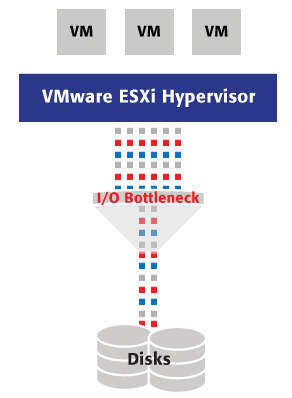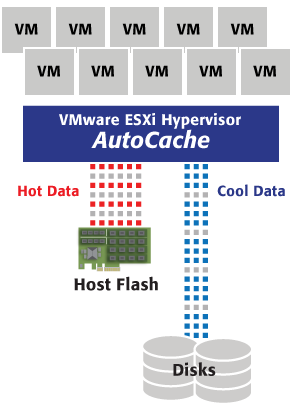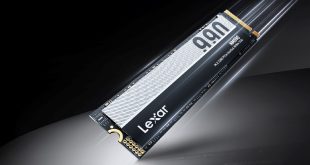Samsung Electronics this week acquired Proximal Data, a provider of server-side caching software with I/O intelligence that works within virtualized systems. Thanks to Auto Cache software from Proximal Data, Samsung will be able to offer specialised caching solid-state drives for hyperscale datacentres. This will improve Samsung’s competitive advantages over rivals and will let it enter new markets.
Caching software increases storage performance by controlling and storing frequently used data more efficiently. Proximal Data’s AutoCache is the only I/O caching solution designed specifically to increase VM [virtual machine] density by up to three times and accelerate business critical applications in virtualized servers. AutoCache supports any datastore, whether connected by block protocols or network file system (NFS).
AutoCache attaches inside standard hypervisors (e.g., VMware ESXi 4.1 and 5.0/5.1), where it inspects all I/O from all virtual machines and places hot I/O into a local PCIe flash card or solid-state drive (SSD). By design, AutoCache is a read cache with write through and write around semantics. Embedded intelligence supplies hot reads back to the VMs that request them, without requiring any effort from administrators to modify the deployed storage or VM infrastructure. AutoCache creates a universal cache for all VMs that adapts automatically to the changing workloads of the environment, shifting cache resources on the fly to VMs that most need them, as defined by a set of advanced, concurrently running algorithms.


Advantages of AutoCache: before and after implementation
“We are delighted to have Proximal Data join us, which will enable us to enhance our competence in SSD-based software for server systems,” said Bob Brennan, senior vice president of the memory R&D team at Samsung Semiconductor. “With this acquisition, we will be able to further expand our SSD business in the server and data center markets, while continuing to provide the most advanced SSD solutions to customers.”
At present AutoCache is compatible with various PCIe solid-state storage accelerators (from Intel, Seagate and Micron) as well as SSDs from different vendors. Once Proximal Data becomes a part of Samsung, the company will focus all further development efforts on its own NAND flash storage solutions.
Proximal Data’s AutoCache gives Samsung a unique advantage on the market of SSDs for modern datacenters. Moreover, it allows the company to create special caching SSDs for enterprise use, something the company has not developed before.
Discuss on our Facebook page, HERE.
KitGuru Says: Samsung is slowly growing its presence on the market of enterprise-class solid-state drives. With an acquisition like that, Samsung will become a major player on the market of caching SSDs several years down the road. It is noteworthy that Seagate Technology is now a major player on that market after it acquired Nytro portfolio of PCIe SSD solutions from Avago. By taking over Proximal Data and developing caching SSDs, Samsung will compete directly with Seagate Technology, a strategic partner to whom the company supplies NAND flash memory.
 KitGuru KitGuru.net – Tech News | Hardware News | Hardware Reviews | IOS | Mobile | Gaming | Graphics Cards
KitGuru KitGuru.net – Tech News | Hardware News | Hardware Reviews | IOS | Mobile | Gaming | Graphics Cards



Finally! There is a great way how you can work online from your home using your computer and earn in the same time… Only basic internet knowledge needed and fast internet connection… Earn as much as $3000 a week… > ->GET MORE INFO HERE<-
Finally! There is a great way how you can work online from your home using your computer and earn in the same time… Only basic internet knowledge needed and fast internet connection… Earn as much as $3000 a week… > ->GET MORE INFO HERE<-